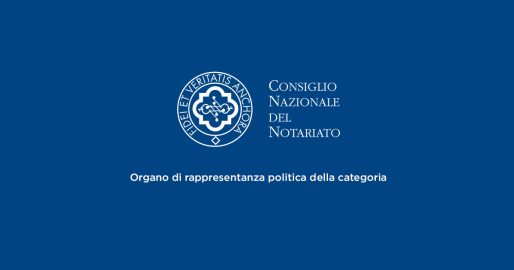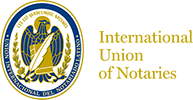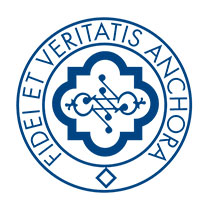The National Council of Notaries grants sponsorship to initiatives of particular professional, cultural, scientific, social, educational, environmental and economic value which are promoted by third parties, both public and private, and have to do with and are consistent with the CNN’s areas of operation and goals and the enhancement of the role of the Notariat.
In recent years relations have increased substantially with non-profit bodies with whom CNN – by way of its Communications Office – cooperates for the implementation of their Testamentary Legacies Campaign. This often involves local meetings between notaries and citizens with a view to responding in simple language to ever more frequent requests for information about inheritance law.
These initiatives are promoted by the Associations to develop – as has already been the case for some years in Anglo-Saxon countries – a culture of testamentary legacies as an instrument for securing part of their necessary resources.
From October 2011 until today, the National Council of Notaries has granted its sponsorship to and has actively cooperated with the following Associations:
Action Aid: Hunger afflicts over a billion people and is the major cause of death in the world. For this reason, the Association in 2010 launched its “Operation Hunger” campaign, appealing to citizens, governments, international organisations and businesses to support the right to food, to allow people living in poverty to mobilise to claim, obtain and enjoy their fundamental rights.
AISLA: the Italian Association for Amyotrophic Lateral Sclerosis, founded in 1983, has concentrated its efforts on providing information to patients, family members and healthcare professionals and on organising conventions and conferences for doctors, nurses and physiotherapists. ALS is a neurological disease that attacks motor neurons and that gradually limits muscular life. Its origins are still unknown; it was described for the fist time in 1874 by the French neurologist Jean-Marie Charcot.
AISM: the Italian Multiple Sclerosis Association is the point of reference for more than 60,000 persons who are afflicted by the disease and for their families. In order to offer them the right to a good quality of life and full social integration, AISM has worked throughout Italy for over 40 years – through more than 10,000 volunteers – on a public awareness campaign. Since 1998 it has been assisted by FISM, the Italian Multiple Sclerosis Foundation, which was set up to carry on financing and promoting scientific research on the disease. The Honorary President of AISM and FISM was the Nobel Laureate Rita Levi Montalcini.
Aiutare i Bambini: its mission is to help and support poor, sick, uneducated children, or those who have suffered physical or moral violence, in order to give them opportunity and hope for a dignified life. To that end, it promotes and supports projects and initiatives world-wide to provide hospitality, healthcare, education and vocational training.
Antoniano di Bologna: founded in 1953 by the Grey-Friars of the Convent of Saint Anthony of Bologna, in addition to running a soup kitchen, the Academy of Dramatic Art and a cinema-theatre, as well as projects for disabled children and children in emergency situations, in the Sixties entirely new activities were added, such as television and recording productions. Of these, the Zecchino d’Oro acquired a huge popular following and became an important building block in the history of Italian television.
CBM Italia: this is a Non-Government Organisation (NGO) which aims to defeat forms of preventable blindness and physical and mental disability in the poorest countries of the world, without regard to race, gender or religion. To this end, it implements programs and projects for prevention and treatment, works for public awareness, involving the national and international community in the struggle against blindness and other preventable disabilities in developing nations.
Fondazione Grigioni for Parkinson’s Disease: this is a non-profit entity that raises funds for scientific research into a disease that attacks the central nervous system: it leads to degeneration of some nerve cells (neurons) situated in a specific area of the brain. At present, there is no cure.
Fondazione Telethon: since 1990 Telethon, together with millions of Italians, has been carrying on a campaign to defeat muscular dystrophy and other genetic diseases. In order to ensure research receives maximum funds, Telethon works all year round and has put in place a rigorous administration system: of every euro raised, approximately 77 cents end up financing advanced laboratories and institutions and institutional activities related to research.
Greenpeace: this is an independent global organisation and one of the greatest environmental movements in the world. It is present in 40 countries in Europe, the Americas, Asia, Africa and the Pacific. It runs campaigns and works to change people’s opinions and behaviour, to protect and preserve the environment and to promote peace.
Gruppo Abele: set up in Turin in 1965, this group is made up of about 40 activities including drop-in services, communities dealing with dependency problems, areas for hospitality and orientation, aid projects for migrants and the victims of crime and some paths toward conflict mediation. Also development cooperation projects in Africa and in Mexico and in Turin a consortium of social cooperatives that finds work for people with a difficult past.
Mani Tese: since 1964, this Association has been committed to building – through integrated development programs involving local communities – a more equal society in the world, ensuring the social, cultural and political conditions necessary for the full realisation of the human person, so as to allow all women and men a dignified life free of exploitation, without prejudice to the actions and opportunities of future generations. The organisation is present in 14 countries in Asia, Africa and Latin America.
MSF: Doctors Without Borders is the world’s largest independent medical-humanitarian organisation, created by doctors and journalists in France in 1971. Today it provides humanitarian assistance in over 60 countries to populations whose survival is threatened by war, epidemics, malnutrition, exclusion from healthcare or natural catastrophes. In 1999 it received the Nobel Peace Prize.
SOS Villaggi dei Bambini: this is an international organisation that for over 60 years has been committed to caring for children deprived of parental care or temporarily removed from their families. It promotes programs for the prevention of abandonment and for the strengthening of family ties in Italy and another 132 countries around the world.
Università Campus Bio-Medico di Roma: promotes knowledge of and the interdisciplinary nature of the sciences, through integrated facilities for teaching, research and healthcare, pursuing the objective of the overall wellness of the person. It offers students a training experience aimed at cultural, professional and human growth and cares for patients in a holistic manner, in both the material and spiritual dimensions.






